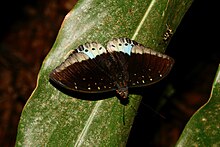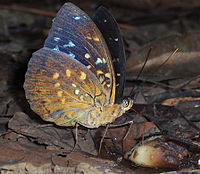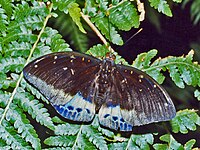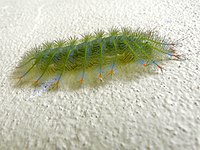Lexias pardalis
| Lexias pardalis | |
|---|---|

| |
| Male – dorsal view | |

| |
| Female – dorsal view | |
| Scientific classification | |
| Domain: | Eukaryota |
| Kingdom: | Animalia |
| Phylum: | Arthropoda |
| Class: | Insecta |
| Order: | Lepidoptera |
| Family: | Nymphalidae |
| Genus: | Lexias |
| Species: | L. pardalis |
| Binomial name | |
| Lexias pardalis Moore, 1878 | |
| Synonyms | |
| |
Lexias pardalis, the common archduke, is a butterfly of the family Nymphalidae.
Subspecies
Subspecies include:[2]
- L. p. pardalis (Hainan)
- L. p. jadeitina (Fruhstorfer, 1913) (north-eastern India, Cambodia, Burma – northern Thailand, southern Yunnan)
- L. p. eleanor (Fruhstorfer, 1898) (southern China, Laos, Vietnam)
- L. p. nephritica (Fruhstorfer, 1913) (Sumatra)
- L. p. nasiensis Tsukada, 1991 (Nias)
- L. p. gigantea (Fruhstorfer, 1898) (Nias)
- L. p. pallidulus Tsukada, 1991 (Musala Island)
- L. p. dirteana (Corbet, 1941) (Singapore)
- L. p. ritsemae (Fruhstorfer, 1906) (Bangka)
- L. p. silawa (Fruhstorfer, 1913) (Belitung)
- L. p. nigricans Hanafusa, 1989 (Karimata)
- L. p. borneensis Tsukada, 1991 (Borneo, Natuna, Laut)
- L. p. cavarna (Fruhstorfer, 1913) (Philippines, Balabac)
- L. p. tethys Tsukada, 1991 (Philippines, Palawan)
- L. p. ellora (Fruhstorfer, 1898) (Philippines, Mindoro)
- L. p. saifuli Hanafusa, 1992
Distribution
This species can be found in the Indomalayan realm.[2]
Habitat
Lexias pardalis prefer paths, clearings and edges of primary forests and they are easily sighted in sunny areas standing on the forest floor.
Description
Lexias pardalis has a wingspan reaching about 80–90 millimetres (3.1–3.5 in). This species exhibits a strong sexual dimorphism, with very different pattern and colour. The upperside of the wings of the male are black with shimmering greenish-blue margins, especially in the hindwings. The uppersides of the cryptic wings of the larger females are dark brown with several rows of yellow spots, a pale green pattern on the lower wings. The wing pattern of yellow spots continue across the thorax and the abdomen.
The undersides in the males are brownish with whitish spots, while in the female the forewings are dark brown and the hindwings are pale bluish green, with whitish spots in both wings. The apical portion of the antennae are yellow orange in both sexes, while in the very similar species Lexias dirtea the clubs are black.
Biology
Larvae feed on Cratoxylum formosum and Cratoxylum cochinchinense, while adults mainly feed on rotting fruits, especially in the genus Garcinia, but also on nectar of flowers. Caterpillars of the last instars are pale green and have many spines radiating from the body. Also the chrysalis is pale green.
Gallery
- Ventral view
- Male - dorsal view
- Male - dorsal view
- Male - dorsal view - Sumatra, Indonesia
- Caterpillar, Malaysia
References
- ^ BioLib.cz
- ^ a b "Lexias Boisduval, 1832" at Markku Savela's Lepidoptera and Some Other Life Forms
External links
 Media related to Lexias pardalis at Wikimedia Commons
Media related to Lexias pardalis at Wikimedia Commons- Butterfly Circle
- Caterpillar






